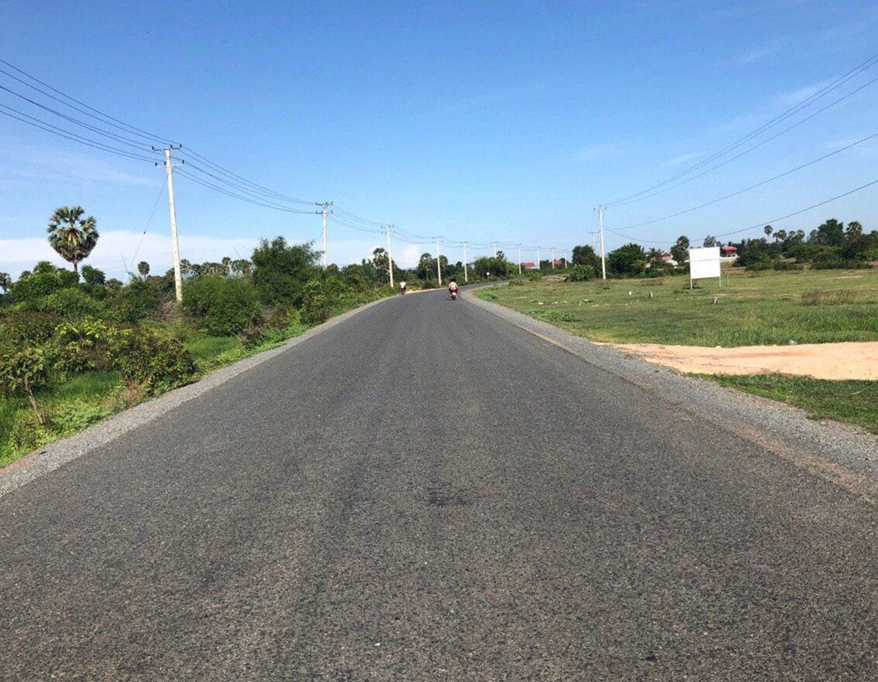Impact and Outcome
The impact of the project is improved access to markets, jobs, and social services in ten project provinces. This impact is consistent with the sector results framework of the Cambodia Transport Sector Assessment, Strategy, and Roadmap. The outcome of the project is a safe, climate-resilient, and cost effective rural road network that provides all-year access in the agricultural areas of the nine project provinces. These ten provinces are populated by a large proportion of Cambodia’s rural communities.
Outputs of the project
There are five key outputs in this project:
I. Rural Roads Improvements. The first output is improvement of about 1,200 km of rural roads to climate resilient paved condition. Under this output, two contracts will be a pilot performance-based contract over a 5.5-year duration. This output also includes green planting and design and implementation supervision consulting services.
II. Rural Road Asset Management. The second output of the project will improve rural road asset management in a sustainable manner through a strong capacity-building program. This program will continue the interventions initiated in Loan 2670, including the overloading prevention program for rural roads to efficiently manage the road assets. This output continues its focus on improvement the overall construction industry for rural road maintenance as initiated during Loan 2670, including capacity development of provincial departments of rural development (PDRD) who implement road maintenance works and capacity building training of local maintenance contractors. Further, the output will also introduce capacity building approaches for gradual reduction of force account by PDRDs through lessons learned from the ongoing similar intervention in the Ministry of Public Works and Transport. The output will provide hands on capacity building PDRD staff in the implementation of performance-based contracts for the maintenance of RRIP rehabilitated roads, through international competitive bidding (ICB) contracts for a period of 5.5 years.
III. Rural Road Safety and Community Awareness Program. The third output will increase the awareness and application of road safety and safeguards by (i) further expanding the pilot community-based road safety awareness program initiated in Loan 2670, including education program for schools, drivers, road users, and the community that also incorporates road safety provisions in road design; (ii) further strengthening the capacity of the social and environment office in MRD established in 2012; (iii) implementing an HHTPP and (iv) conducting a sex disaggregated baseline socioeconomic survey of project beneficiaries.
IV. Project Management Support. The fourth output is to strengthen the capacity of MRD to provide efficient project management support for project implementation. The project will also promote substantial positive employment and gender impacts in the rural communities under all outputs. The Gender Action Plan (GAP) will incorporate all the labor and gender mainstreaming in all 5 project outputs. Through lessons learned from ongoing Loan 2670, the project will strengthen MRD’s focus more on all outputs equally as the tendency has been somewhat inclined towards road improvement activities. This will be achieved through increased MRD staff resources in social, gender, and safeguards areas.
V Connectivity Improvements for Mekong River Islands. The fifth output has two sub-outputs: (i) to rehabilitate roads and jetties within a 5-island cluster in the Mekong River (Koh Mitt, Koh Pir, Koh Samrong, Koh Soutin, and Koh Thmei) in order to improve climate resilient access and connectivity. The civil works contract for rehabilitating roads and jetties also includes provisions for small-scale levees and water management interventions to minimize flooding; and (ii) to develop a climate change adaptation framework and its associated investments of minor activities of multi-sector nature (agriculture, renewable energy, tourism, water supply, etc.) that will be designed and implemented during the proposed project, include a community-based emergency management system. Although this output will be piloted for the Mekong River Island cluster, it may be replicated in other similar areas with remote access.

